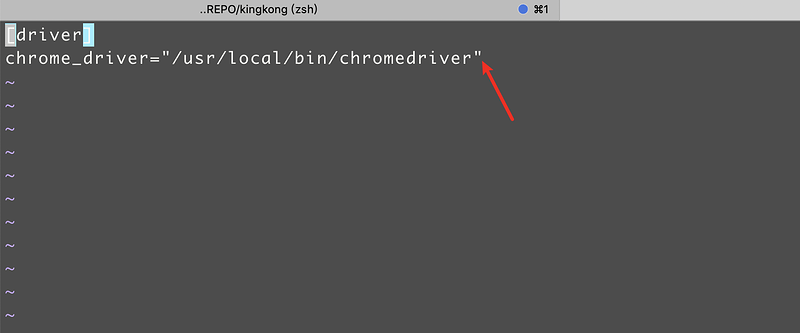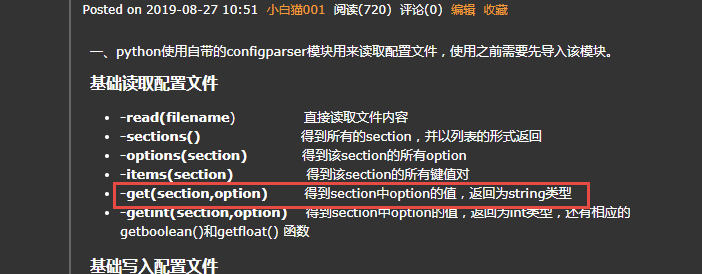环境:
Mac
前提:
在脚本中不指定Chromedriver路径,能够成功打开浏览器;
指定脚本路径后,打开失败,会一直报'chromedriver.exe"' executable needs to be in PATH
尝试:
确认chromedriver路径在/usr/local/bin下,并配置了环境变量,但是指定路径执行时,仍然报错。
报错信息如下
web_ut.py:44 (ISelenium.test_webui_2)
self = <selenium.webdriver.chrome.service.Service object at 0x112008450>
def start(self):
"""
Starts the Service.
:Exceptions:
- WebDriverException : Raised either when it can't start the service
or when it can't connect to the service
"""
try:
cmd = [self.path]
cmd.extend(self.command_line_args())
self.process = subprocess.Popen(cmd, env=self.env,
close_fds=platform.system() != 'Windows',
stdout=self.log_file,
stderr=self.log_file,
> stdin=PIPE)
/Library/Frameworks/Python.framework/Versions/3.7/lib/python3.7/site-packages/selenium/webdriver/common/service.py:76:
_ _ _ _ _ _ _ _ _ _ _ _ _ _ _ _ _ _ _ _ _ _ _ _ _ _ _ _ _ _ _ _ _ _ _ _ _ _ _ _
self = <subprocess.Popen object at 0x112008c50>
args = ['"/usr/local/bin/chromedriver.exe"', '--port=50520'], bufsize = -1
executable = None, stdin = -1, stdout = -3, stderr = -3, preexec_fn = None
close_fds = True, shell = False, cwd = None
env = environ({'PATH': '/Users/yu/Library/Python/3.7/bin:/Applications/Google Chrome.app/Contents/MacOS:/Users/yu/maven/apac... 'HOME': '/Users/yu', 'TEAMCITY_VERSION': 'LOCAL', 'PYTEST_CURRENT_TEST': 'web_ut.py::ISelenium::test_webui_2 (call)'})
universal_newlines = None, startupinfo = None, creationflags = 0
restore_signals = True, start_new_session = False, pass_fds = ()
def __init__(self, args, bufsize=-1, executable=None,
stdin=None, stdout=None, stderr=None,
preexec_fn=None, close_fds=True,
shell=False, cwd=None, env=None, universal_newlines=None,
startupinfo=None, creationflags=0,
restore_signals=True, start_new_session=False,
pass_fds=(), *, encoding=None, errors=None, text=None):
"""Create new Popen instance."""
_cleanup()
# Held while anything is calling waitpid before returncode has been
# updated to prevent clobbering returncode if wait() or poll() are
# called from multiple threads at once. After acquiring the lock,
# code must re-check self.returncode to see if another thread just
# finished a waitpid() call.
self._waitpid_lock = threading.Lock()
self._input = None
self._communication_started = False
if bufsize is None:
bufsize = -1 # Restore default
if not isinstance(bufsize, int):
raise TypeError("bufsize must be an integer")
if _mswindows:
if preexec_fn is not None:
raise ValueError("preexec_fn is not supported on Windows "
"platforms")
else:
# POSIX
if pass_fds and not close_fds:
warnings.warn("pass_fds overriding close_fds.", RuntimeWarning)
close_fds = True
if startupinfo is not None:
raise ValueError("startupinfo is only supported on Windows "
"platforms")
if creationflags != 0:
raise ValueError("creationflags is only supported on Windows "
"platforms")
self.args = args
self.stdin = None
self.stdout = None
self.stderr = None
self.pid = None
self.returncode = None
self.encoding = encoding
self.errors = errors
# Validate the combinations of text and universal_newlines
if (text is not None and universal_newlines is not None
and bool(universal_newlines) != bool(text)):
raise SubprocessError('Cannot disambiguate when both text '
'and universal_newlines are supplied but '
'different. Pass one or the other.')
# Input and output objects. The general principle is like
# this:
#
# Parent Child
# ------ -----
# p2cwrite ---stdin---> p2cread
# c2pread <--stdout--- c2pwrite
# errread <--stderr--- errwrite
#
# On POSIX, the child objects are file descriptors. On
# Windows, these are Windows file handles. The parent objects
# are file descriptors on both platforms. The parent objects
# are -1 when not using PIPEs. The child objects are -1
# when not redirecting.
(p2cread, p2cwrite,
c2pread, c2pwrite,
errread, errwrite) = self._get_handles(stdin, stdout, stderr)
# We wrap OS handles *before* launching the child, otherwise a
# quickly terminating child could make our fds unwrappable
# (see #8458).
if _mswindows:
if p2cwrite != -1:
p2cwrite = msvcrt.open_osfhandle(p2cwrite.Detach(), 0)
if c2pread != -1:
c2pread = msvcrt.open_osfhandle(c2pread.Detach(), 0)
if errread != -1:
errread = msvcrt.open_osfhandle(errread.Detach(), 0)
self.text_mode = encoding or errors or text or universal_newlines
# How long to resume waiting on a child after the first ^C.
# There is no right value for this. The purpose is to be polite
# yet remain good for interactive users trying to exit a tool.
self._sigint_wait_secs = 0.25 # 1/xkcd221.getRandomNumber()
self._closed_child_pipe_fds = False
try:
if p2cwrite != -1:
self.stdin = io.open(p2cwrite, 'wb', bufsize)
if self.text_mode:
self.stdin = io.TextIOWrapper(self.stdin, write_through=True,
line_buffering=(bufsize == 1),
encoding=encoding, errors=errors)
if c2pread != -1:
self.stdout = io.open(c2pread, 'rb', bufsize)
if self.text_mode:
self.stdout = io.TextIOWrapper(self.stdout,
encoding=encoding, errors=errors)
if errread != -1:
self.stderr = io.open(errread, 'rb', bufsize)
if self.text_mode:
self.stderr = io.TextIOWrapper(self.stderr,
encoding=encoding, errors=errors)
self._execute_child(args, executable, preexec_fn, close_fds,
pass_fds, cwd, env,
startupinfo, creationflags, shell,
p2cread, p2cwrite,
c2pread, c2pwrite,
errread, errwrite,
> restore_signals, start_new_session)
/Library/Frameworks/Python.framework/Versions/3.7/lib/python3.7/subprocess.py:800:
_ _ _ _ _ _ _ _ _ _ _ _ _ _ _ _ _ _ _ _ _ _ _ _ _ _ _ _ _ _ _ _ _ _ _ _ _ _ _ _
self = <subprocess.Popen object at 0x112008c50>
args = ['"/usr/local/bin/chromedriver.exe"', '--port=50520']
executable = b'"/usr/local/bin/chromedriver.exe"', preexec_fn = None
close_fds = True, pass_fds = (), cwd = None
env = environ({'PATH': '/Users/yu/Library/Python/3.7/bin:/Applications/Google Chrome.app/Contents/MacOS:/Users/yu/maven/apac... 'HOME': '/Users/yu', 'TEAMCITY_VERSION': 'LOCAL', 'PYTEST_CURRENT_TEST': 'web_ut.py::ISelenium::test_webui_2 (call)'})
startupinfo = None, creationflags = 0, shell = False, p2cread = 11
p2cwrite = 12, c2pread = -1, c2pwrite = 13, errread = -1, errwrite = 13
restore_signals = True, start_new_session = False
def _execute_child(self, args, executable, preexec_fn, close_fds,
pass_fds, cwd, env,
startupinfo, creationflags, shell,
p2cread, p2cwrite,
c2pread, c2pwrite,
errread, errwrite,
restore_signals, start_new_session):
"""Execute program (POSIX version)"""
if isinstance(args, (str, bytes)):
args = [args]
else:
args = list(args)
if shell:
# On Android the default shell is at '/system/bin/sh'.
unix_shell = ('/system/bin/sh' if
hasattr(sys, 'getandroidapilevel') else '/bin/sh')
args = [unix_shell, "-c"] + args
if executable:
args[0] = executable
if executable is None:
executable = args[0]
orig_executable = executable
# For transferring possible exec failure from child to parent.
# Data format: "exception name:hex errno:description"
# Pickle is not used; it is complex and involves memory allocation.
errpipe_read, errpipe_write = os.pipe()
# errpipe_write must not be in the standard io 0, 1, or 2 fd range.
low_fds_to_close = []
while errpipe_write < 3:
low_fds_to_close.append(errpipe_write)
errpipe_write = os.dup(errpipe_write)
for low_fd in low_fds_to_close:
os.close(low_fd)
try:
try:
# We must avoid complex work that could involve
# malloc or free in the child process to avoid
# potential deadlocks, thus we do all this here.
# and pass it to fork_exec()
if env is not None:
env_list = []
for k, v in env.items():
k = os.fsencode(k)
if b'=' in k:
raise ValueError("illegal environment variable name")
env_list.append(k + b'=' + os.fsencode(v))
else:
env_list = None # Use execv instead of execve.
executable = os.fsencode(executable)
if os.path.dirname(executable):
executable_list = (executable,)
else:
# This matches the behavior of os._execvpe().
executable_list = tuple(
os.path.join(os.fsencode(dir), executable)
for dir in os.get_exec_path(env))
fds_to_keep = set(pass_fds)
fds_to_keep.add(errpipe_write)
self.pid = _posixsubprocess.fork_exec(
args, executable_list,
close_fds, tuple(sorted(map(int, fds_to_keep))),
cwd, env_list,
p2cread, p2cwrite, c2pread, c2pwrite,
errread, errwrite,
errpipe_read, errpipe_write,
restore_signals, start_new_session, preexec_fn)
self._child_created = True
finally:
# be sure the FD is closed no matter what
os.close(errpipe_write)
# self._devnull is not always defined.
devnull_fd = getattr(self, '_devnull', None)
if p2cread != -1 and p2cwrite != -1 and p2cread != devnull_fd:
os.close(p2cread)
if c2pwrite != -1 and c2pread != -1 and c2pwrite != devnull_fd:
os.close(c2pwrite)
if errwrite != -1 and errread != -1 and errwrite != devnull_fd:
os.close(errwrite)
if devnull_fd is not None:
os.close(devnull_fd)
# Prevent a double close of these fds from __init__ on error.
self._closed_child_pipe_fds = True
# Wait for exec to fail or succeed; possibly raising an
# exception (limited in size)
errpipe_data = bytearray()
while True:
part = os.read(errpipe_read, 50000)
errpipe_data += part
if not part or len(errpipe_data) > 50000:
break
finally:
# be sure the FD is closed no matter what
os.close(errpipe_read)
if errpipe_data:
try:
pid, sts = os.waitpid(self.pid, 0)
if pid == self.pid:
self._handle_exitstatus(sts)
else:
self.returncode = sys.maxsize
except ChildProcessError:
pass
try:
exception_name, hex_errno, err_msg = (
errpipe_data.split(b':', 2))
# The encoding here should match the encoding
# written in by the subprocess implementations
# like _posixsubprocess
err_msg = err_msg.decode()
except ValueError:
exception_name = b'SubprocessError'
hex_errno = b'0'
err_msg = 'Bad exception data from child: {!r}'.format(
bytes(errpipe_data))
child_exception_type = getattr(
builtins, exception_name.decode('ascii'),
SubprocessError)
if issubclass(child_exception_type, OSError) and hex_errno:
errno_num = int(hex_errno, 16)
child_exec_never_called = (err_msg == "noexec")
if child_exec_never_called:
err_msg = ""
# The error must be from chdir(cwd).
err_filename = cwd
else:
err_filename = orig_executable
if errno_num != 0:
err_msg = os.strerror(errno_num)
if errno_num == errno.ENOENT:
err_msg += ': ' + repr(err_filename)
> raise child_exception_type(errno_num, err_msg, err_filename)
E FileNotFoundError: [Errno 2] No such file or directory: '"/usr/local/bin/chromedriver.exe"': '"/usr/local/bin/chromedriver.exe"'
/Library/Frameworks/Python.framework/Versions/3.7/lib/python3.7/subprocess.py:1551: FileNotFoundError
During handling of the above exception, another exception occurred:
self = <test.web_ut.ISelenium testMethod=test_webui_2>
def setUp(self):
config = self.get_config()
# 控制是否采用无界面形式运行自动化测试
try:
using_headless = os.environ["using_headless"]
except KeyError:
using_headless = None
print('没有配置环境变量 using_headless, 按照有界面方式运行自动化测试')
chrome_options = Options()
if using_headless is not None and using_headless.lower() == 'true':
print('使用无界面方式运行')
chrome_options.add_argument("--headless")
self.driver = webdriver.Chrome(executable_path=config.get('driver', 'chrome_driver'),
> options=chrome_options)
web_ut.py:37:
_ _ _ _ _ _ _ _ _ _ _ _ _ _ _ _ _ _ _ _ _ _ _ _ _ _ _ _ _ _ _ _ _ _ _ _ _ _ _ _
/Library/Frameworks/Python.framework/Versions/3.7/lib/python3.7/site-packages/selenium/webdriver/chrome/webdriver.py:73: in __init__
self.service.start()
_ _ _ _ _ _ _ _ _ _ _ _ _ _ _ _ _ _ _ _ _ _ _ _ _ _ _ _ _ _ _ _ _ _ _ _ _ _ _ _
self = <selenium.webdriver.chrome.service.Service object at 0x112008450>
def start(self):
"""
Starts the Service.
:Exceptions:
- WebDriverException : Raised either when it can't start the service
or when it can't connect to the service
"""
try:
cmd = [self.path]
cmd.extend(self.command_line_args())
self.process = subprocess.Popen(cmd, env=self.env,
close_fds=platform.system() != 'Windows',
stdout=self.log_file,
stderr=self.log_file,
stdin=PIPE)
except TypeError:
raise
except OSError as err:
if err.errno == errno.ENOENT:
raise WebDriverException(
"'%s' executable needs to be in PATH. %s" % (
> os.path.basename(self.path), self.start_error_message)
E selenium.common.exceptions.WebDriverException: Message: 'chromedriver.exe"' executable needs to be in PATH. Please see https://sites.google.com/a/chromium.org/chromedriver/home
疑问:
1、为什么指定路径的时候会找不到chromedriver呢?
2、为什么不指定具体执行路径的时候(前置条件是将chromedirver放置到了/usr/local/bin目录下),就会成功执行chromedriver呢?



